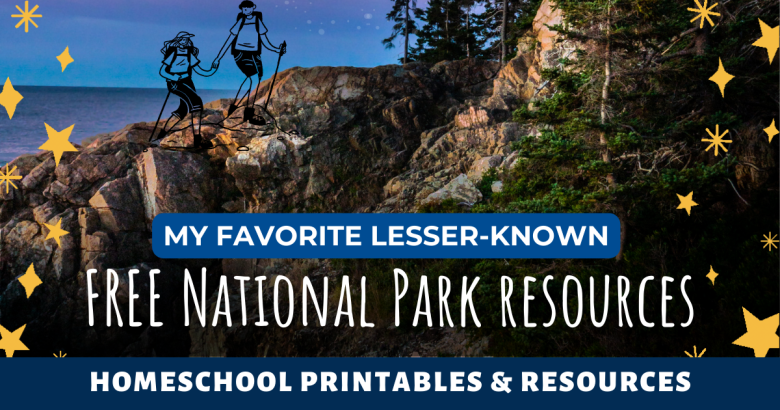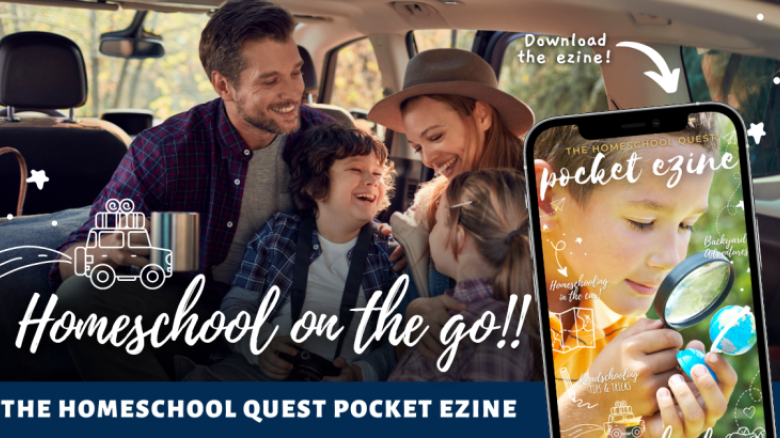By Shanda Smith, ShandaSmith.com
Towering redwoods, pristine wild beaches, and prismatic hot springs are common visuals when we think of National Parks. And with good reason. The National Park system contains some of the most beautiful vistas and interesting ecosystems in our country.
In-person learning at a National Park is an amazing once-in-a-lifetime experience. Walking in the footsteps of our forefathers and places where history comes alive, where science becomes a hands-on experience, and everyone finds their inner naturalist.
The National Park System holds a substantial amount of educational and historical information. Taking a hike, planning a picnic, and completing your Junior Ranger booklet to get sworn in as a Junior National Park Ranger will give you lifelong memories you can enjoy as a family.
But the fun isn’t limited to park visits. The National Park Service has amassed an extensive amount of online resources and educational materials perfect for educating our children at home.
Here are my four favorite lesser-known National Park Educational Resources:
1. Premade curriculum and online lesson plans:
It is no surprise that an organization as widespread as the National Park System, combined with the passion of the Park Service employees, has given us a diverse set of online lesson plans. Most of the materials are designed for the classroom, but easily converted to our homeschoolers' curricula.
The resources are usually divided by grades. Some include science experiments. But the best part is the online lesson plans are concise. This allows you to add activities your student will find most interesting.
To find these resources on any National Park location website, click on “Learn About the Park” from the menu and then click on “Education” from the drop-down menu. Each location has their own unique learning materials, and some locations do not have an online curriculum. Also, check under “Kids & Youth” from that drop-down menu. Many have the Junior Ranger book uploaded.
Example Curriculum:
Booker T Washington National Monument, Virginia
2. Multimedia Presentations and Photo Archives:
Most National Park System locations have a multimedia theater where they show educational videos and area information that give you a full introduction to the significance of the location and the people who were influential to the area.
Many of those featured recordings are available online. These impartial and fact-based videos are a great resource to introduce materials for that particular subject. Most are based on real people from history, first-hand experiences, and natural phenomena.
A few national parks even offer virtual tours.
Example Video:
Vicksburg National Military Park, Mississippi
3. National Park Trading Cards:
One hidden gem for the Park system is the trading card program. This program started with the 150th anniversary of the Civil War and continues today. Each card offers a bite-sized amount of information and a correlating photo.
Each National Park has their own cards, and you can only get them with an in-person visit to the parks. But, in true NPS style, these cards are offered online for at-home viewing. This link below can take you to the NPS Flickr account to view the cards.
4. Native plants and animals in the park system:
National Park websites are a great way to look at the native plants and animals from a specific area. These animals are still allowed to roam free in their natural habitats, where scientists continue to monitor and study their natural behaviors.
These animals will continue to impact their natural areas of habitation and be seen by generations to come as their habitats are protected through our National Park system.
On the National Park website, click on “Learn About the Park” and scroll down to select “Nature”. Here you will find an amazing amount of information about the local plants and animals in a National Park system.
This is a perfect way for your animal lover to get a quality overview of the flora and fauna in a particular location. You never know… this may be the perfect online research option for your budding naturalist.
Click here for more information.
I recommend looking for these resources through the National Park system locations nearest you. You are most likely to visit those locations, and it's a great way to “tease” an upcoming outing or vacation with your children.
Just search for your local National Park at www.nps.gov for your state and neighboring states. Don’t forget to look for the National Parks near family you may visit throughout the year. And, check the calendar of events for each park.
Almost all parks have regularly scheduled activities that are free once your admission is paid. If there are no listed events, just call the park and ask about the schedule. Some parks even offer educational tours for a low price point that may make an amazing field trip or even a vacation excursion.
The National Park system is an amazing network of physical locations, historical information, scientific research, and the preservation of our natural landscapes. My hope is that you will find some way to include the National Park system and its educational resources in your homeschool year.
Read More!
- Log in to post comments

